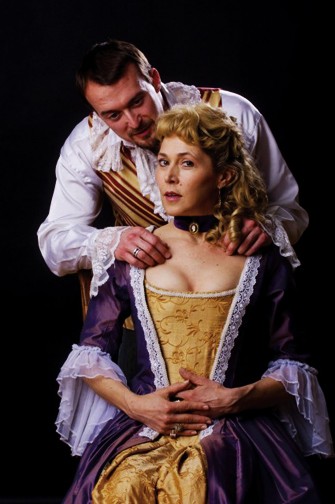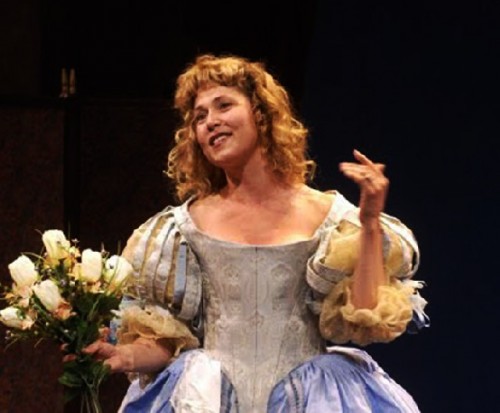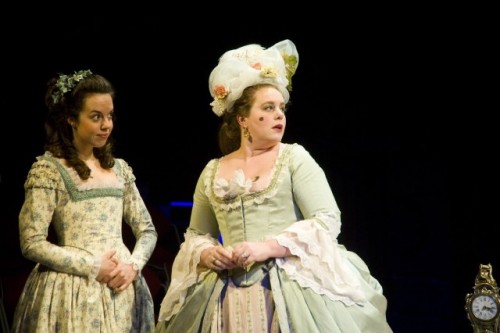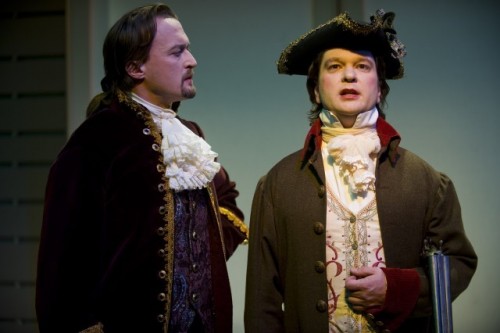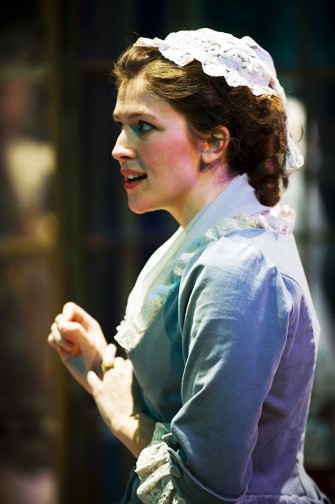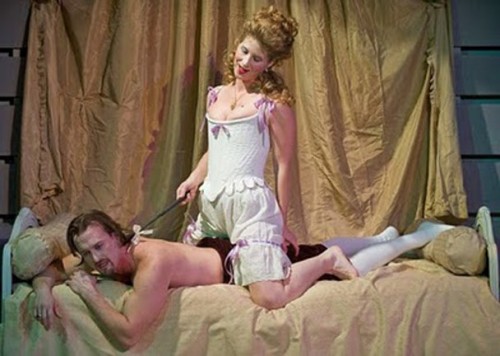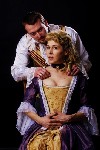Les Liaisons Dangereuses Torments
Shakespeare & Company Through March 21
By: Charles Giuliano - Feb 12, 2010
Les Liaisons Dangereuses (Dangerous Liaisons)
By Christopher Hampton
Adapted from the novel by Pierre Choderlos de Laclos
Directed by Tina Packer
Scenic Design, Carl Sprague; Lighting, Stephen Ball; Costumes, Govane Lohbauer; Sound, Michael Pfeiffer; Music composed and performed by Alexander Sovronsky; Choreography, Kristin Wold; Fight choreography, Tony Simotes; Text coach, Clare Reidy; Stage manager, Molly Hennighausen; Cast: Elizabeth Aspenlieder (Madame la Marquise de Merteuil), Lydia Barrett-Mulligan (Cecile de Volanges), Kelly Galvin (Madame de Tourvel), Jennie Burkhard Jadow (Madame de Volanges), Shea Kelly (Adele), Alexandra Lincoln (Emilie, a courtesan), Josh Aaron McCabe (Le Viconte de Valmont), Scot Renzoni (Azalon), Douglas Seldin (Majordomo/ Father Anselme), Enrico Spada (Le Chavalier Danceny), Renee Margaret Speltz (Madama de Rosemonde).
Shakespeare & Company
Elayne P. Bernstein Theatre
January 29 to March 21
Once again, in what is becoming a tradition, Shakespeare & Company has warmed our frosty hearts and minds with a provocative winter play. To ratchet up the thermometer and toss an emotional log on the hearth, Tina Packer, the founding artistic director of the company, is directing the ever so gifted Elizabeth Aspenlieder in an erotic romp set in France on the cusp of Revolution.
Last year Aspenlieder enjoyed great success as Haley Walker in an infectious one woman show Bad Dates by Theresa Rebeck. When she took the show on the road it earned her Boston's prestigious Norton Award. Building on last year's success, what a boon to the company to sell off season tickets in the 190 seat Elayne P. Bernstein Theatre, we are presented a rather long play in two acts with a staggering 18 scenes. The drama Les Liaisons Dangereuses (Dangerous Liaisons) is based on the period novel by Pierre Choderlos de Laclos. It has been adapted as a play by Christopher Hampton. He also translated Yazmina Reza's ART which was presented recently in a staged reading at the Clark Art Institute in a collaboration with Williamstown Theatre Festival. It will be presented at Barrington Stage Company this summer.
The dead of winter productions at S&Co represent a multi-valent agenda. Compared to last season's one woman show this production has a cast of eleven. They all have staff positions and day gigs with the company. The play runs on weekends. To say that they are fully employed is an understatement. But clearly being on stage is a labor of love. It is also great fun to come to know the company in all of its diversity. We recognized Renee Margaret Speltz and Scott Renzoni from a bit of Holiday fluff Cindy Bella. They return here squeezing the life out of minor roles. The leading man in this production, Josh Aaron McCabe (Vicomte de Valmont), will be familiar as Sherlock Holmes in the recent fall hit Hound of the Baskervilles.
In this production, as Jimmy Durante would say "Everybody wants to get into the act." Including current artistic director, Tony Simotes, who has choreographed the fight scene, a duel between Valmont and Madame la Marquise de Merteuil's (Aspenlieder) boy toy Le Chevalier Danceny (Enrico Spada).
There is much to like about this production. It is a delight to see the company so beautifully dressed by Govane Lohbauer. The set by Carl Sprague has been deftly and succinctly managed within budget constraints. Although, with all that randy cavorting about, the ersatz Louis Quinze couch collapsed near the end of the second act. We wondered how that would impact the outcome. But Aspenlieder and McCabe improvised cleverly when he threw her on a chair. It proved to be sturdier in enduring his aborted attempt to ravish the Marquise. That period furniture was evidently not designed to endure rough sex. In another scene the coquette, and recent virgin, Cecile de Volanges (Lydia Barnett-Mulligan) jumps up and down on the bed.
While there is a lot of sex in this play we are at pains to learn the difference between lust and love. While love may be the elixir of matrimony when not consumed deftly it proves to be the arsenic of extra marital affairs. Corpses and ruined reputations pile up at the conclusion of the play.
One readily understands why Packer opted to present this play. It is a great and demanding role for a woman . With sinister intent Merteuil is the match for her male adversary Valmont. He is a libertine and Francophile Casanova. Valmont is a less brilliant and talented version of Britain's outrageous Lord Rochester. It was scandalous for Laclos to present Merteuil as equally predatory, self indulgent, and promiscuous. Society frowns on her as a whore. But only if caught. Valmont, however, is a lusty male exerting his seductive skills. The risk of Les Liaisons Dangereuses falls in her court.
Valmont pays the ultimate price in a duel with Danceny, the love interest of the deflowered Cecile. The dangerous game has cost Valmont his life. But she has wagered the higher stakes of her reputation. Which is why, in matters of love, she insists on getting it in writing. A ruined woman has no place at court. She is forced into seclusion or a nunnery. While a cuckolded husband or lover, such as Danceny, must defend his honor in a duel.
Affairs are accepted if never acknowledged. One must abide by the rules of the game. It is little wonder that Marie Antoinette so enjoyed the novel by Laclos. Surely she identified with the promiscuous Marquise. The Queen may have her discreet and secret lovers. While those of the King enjoyed great status at court like Madame de Pompadour or Madame du Barry.
This is an absorbing but problematic production. It may be approached on many levels reaching beyond an evening of entertainment. While Aspenlieder has been cast in a great and demanding role it does not display her skills to best advantage. She is a brilliant comic actress but there is no humor in this role.
We found ourselves more intrigued by the deft, swaggering and acrobatic performance of McCabe. Marteuil is confined to scheming, clever word play, and the etiquette of courtly life. While her role is understated and controlling he gets to stomp all over the set. His sex scenes with Cecile and the courtesan Emilie (Alexandra Lincoln) are played over the top. He even uses the hunched over Emilie as a desk from which to write a love letter to the virtuous married woman Madame de Tourvel (Kelly Galvin). Tourvel is the pawn in a wager between Valmont and Merteuil.
Proof of the seduction of the challenging Tourvel will earn Valmont the prize of a night in the bed of Merteuil. She is his greatest friend and partner in crime. They amuse each other by discussing their many conquests. But there is a fatal flaw in the game. He confesses to having fallen in love with Tourvel. Merteuil is enraged to learn that she he has lost him to another woman. The fact that he is so uncouth as to actually demand his prize is too great a threat to her cherished independence. As she states venomously what started as a wager has evolved into "war."
As the novel and play delineate there were few options for aristocratic women. A young woman, like Ceclie, must shun the love and passion of Danceny for a safe and wealthy marriage. The security of marriage allows for the discrete pursuit of pleasure. It is a national pastime of the ruling class. A woman was expected to preside over a brilliant and witty salon. She developed skills in dancing, music, needle point, literature, gambling, and witty conversation. Upon marriage she is the property of her husband. Their children are raised by wet nurses and governesses.
Through fate and circumstance Merteuil has been spared the indignity of male dominance. Her husband conveniently died leaving her with wealth, power, independence and social position. She will never remarry or compromise her figure with children. Like her bosom companion Valmont she is capable of taking and discarding lovers as an amusing sport. It is a game they share like cards or chess. Packer forces the image by having them hop about on an ersatz chess board.
There is fatalism as the friends play out their deadly game. The high stakes entail not just their wager but the fate of their class. We are observing the last gasp of the Ancien Regime. It is the mid 1780s and the last scene, a card game in Marteuil's salon, occurs on New Year's Eve. The women are discussing the death of Valmont in his duel with Danceny. There is collateral damage in the miserable death of the seduced then abandoned Tourvel. In the elaborate charade of courtly artifice Merteuil deals her hand but reveals no knowledge or even interest in these events. With arch sangfroid she remarks on having enjoyed the 1780s and is looking forward to the pleasures of the 1790s.
The irony is that 1789 will bring the French Revolution. In the 1790s, during the Reign of Terror, their heads will be severed by the relentless blade of the guillotine. The decadent, useless aristocrats will be consumed by the rage of the Jacobins. The revolutionaries will then turn on each other. Ironically, 1789 would mark the first of several French revolutions. The blood bath will prevail until order is restored by Napoleon. It is interesting to note that Laclos survived the Revolution to serve as a general under Napoleon.
It was Packer's ambition to present Merteuil as a proto feminist and independent women. But the production does not evoke compassion for its characters. Compare, for example, Laclos and his view of women with that of his British peer, Jane Austen. Or think of Merteuil in contrast to the later novel Anna Karenina by Leo Tolstoy. The rococo architecture, art and culture of the Ancien Regime, in all of its elaborate style, ornament and artificiality is an acquired taste. It is an anachronism set against the Age of Enlightenment. Members of the court amused themselves at dinner parties by reading aloud the entries of Diderot in his Encyclopedia. They paid scant attention to Rousseau's The Social Contract or his Rights of Man. Voltaire, when not jailed or exiled, was a prized guest at the salons. The late 18th Century in France produced a brilliant, witty, superficial and ultimately tragic culture.
This production fails to convey the flavor and ambiance of that deliciously decadent and doomed era. The characters puff on the pipe of love but never inhale. It was never possible to loose the sense that these are contemporary actors dressed in period costumes. Perhaps the translation of Hampton was too intent on transforming the florid French of the 18th century into modern prose. It is served as roasted duck without the sauce. In French culture it's all about the condiments. This production never felt very French let alone rococo. But it left me with an emotional agony that signifies an absorbing and challenging evening of theatre. Off with their heads.

